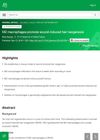Bacteria Induce Skin Regeneration via IL-1β Signaling
April 2021
in “
Cell Host & Microbe
”

TLDR Skin bacteria, specifically Staphylococcus aureus, help in wound healing and hair growth by using IL-1β signaling. Using antibiotics on skin wounds can slow down this natural healing process.
The 2021 study by Wang et al. found that skin bacteria, specifically Staphylococcus aureus, play a crucial role in wound healing and hair follicle regeneration. The research involved germ-free mice and specific pathogen-free mice, and found that the inflammatory cytokine IL-1ß and keratinocyte-dependent IL-1R-MyD88 signaling are necessary for bacteria to promote regeneration. Reducing skin microbiota decreased wound-induced hair follicle neogenesis (WIHN). A small human trial showed that a topical broad-spectrum antibiotic slowed skin wound healing. The study also found that S. aureus exposure led to a 3.3-fold increase in WIHN compared to control mice. The bacteria promoted the development of hair follicles following the pattern of embryonic hair follicle development. The study suggests that stronger and more persistent inflammation signaling stimulates higher WIHN, likely with heterogeneous contributions from different bacterial species. The study also found that IL-1R signaling, specifically IL-1ß, promotes skin regeneration. The research involved multiple groups of mice, with the number of independent animals per group ranging from 3 to 14. The study also found that bacteria-induced skin regeneration is not dependent on certain immune cells (yoT cells) and IL-17A, but more likely through IL-1ß signaling in keratinocytes. In a small human trial, the researchers found that the use of Neosporin, a topical antibiotic, significantly slowed wound healing compared to Vaseline, suggesting that commensal bacteria promote healing. The study involved 2-4 independent human samples per group and 3-9 independent animals per group. The study suggests that the common use of topical prophylactic antibiotics should be discontinued due to their inhibitory effect on the skin's natural healing capacities.












